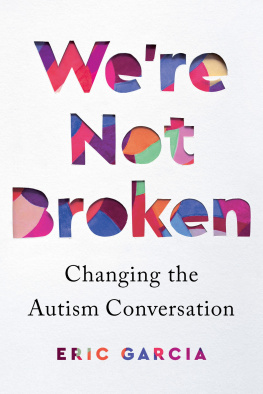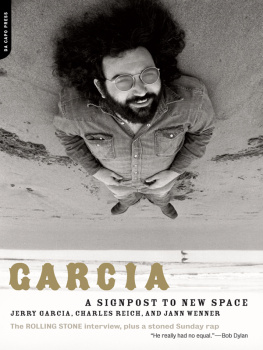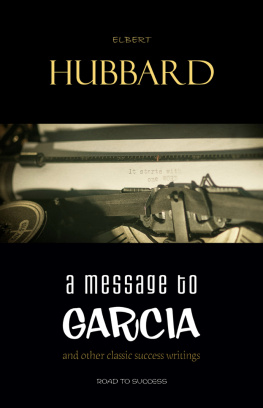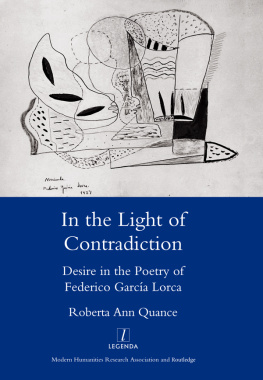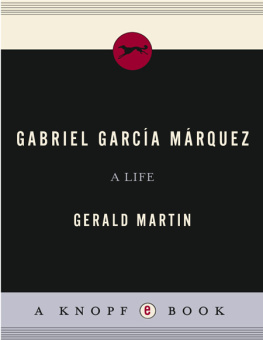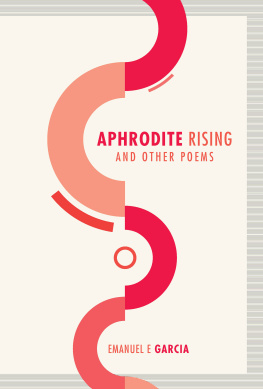Eric Garcia - Were Not Broken
Here you can read online Eric Garcia - Were Not Broken full text of the book (entire story) in english for free. Download pdf and epub, get meaning, cover and reviews about this ebook. year: 2021, publisher: HMH Books, genre: Politics. Description of the work, (preface) as well as reviews are available. Best literature library LitArk.com created for fans of good reading and offers a wide selection of genres:
Romance novel
Science fiction
Adventure
Detective
Science
History
Home and family
Prose
Art
Politics
Computer
Non-fiction
Religion
Business
Children
Humor
Choose a favorite category and find really read worthwhile books. Enjoy immersion in the world of imagination, feel the emotions of the characters or learn something new for yourself, make an fascinating discovery.
- Book:Were Not Broken
- Author:
- Publisher:HMH Books
- Genre:
- Year:2021
- Rating:3 / 5
- Favourites:Add to favourites
- Your mark:
- 60
- 1
- 2
- 3
- 4
- 5
Were Not Broken: summary, description and annotation
We offer to read an annotation, description, summary or preface (depends on what the author of the book "Were Not Broken" wrote himself). If you haven't found the necessary information about the book — write in the comments, we will try to find it.
Were Not Broken — read online for free the complete book (whole text) full work
Below is the text of the book, divided by pages. System saving the place of the last page read, allows you to conveniently read the book "Were Not Broken" online for free, without having to search again every time where you left off. Put a bookmark, and you can go to the page where you finished reading at any time.
Font size:
Interval:
Bookmark:
Copyright 2021 by Eric Garcia
All rights reserved
For information about permission to reproduce selections from this book, write to or to Permissions, Houghton Mifflin Harcourt Publishing Company, 3 Park Avenue, 19th Floor, New York, New York 10016.
hmhbooks.com
Cover design by Pete Garceau
Background image Veronika Demenko / iStock / Getty Images
Library of Congress Cataloging-in-Publication Data
Names: Garcia, Eric, 1990 author.
Title: Were not broken : changing the autism conversation / Eric Garcia.
Description: Boston : Houghton Mifflin Harcourt, 2021. | Includes bibliographical references and index.
Identifiers: LCCN 2020051612 (print) | LCCN 2020051613 (ebook) | ISBN 9781328587848 (hardcover) | ISBN 9780358578338 | ISBN 9780358578741 | ISBN 9781328587879 (ebook)
Subjects: LCSH: Garcia, Eric, 1990Mental health. | Autism. | Autistic PeopleUnited StatesBiography. | Autistic peopleBiography. | Autistic peopleSocial aspects.
Classification: LCC RC553.A88 G364 2021 (print) | LCC RC553.A88 (ebook) | DDC 616.85/8820092 [B]dc23
LC record available at https://lccn.loc.gov/2020051612
LC ebook record available at https://lccn.loc.gov/2020051613
v1.0721
FOR CONNIE AND DELFINA
Your love sustains me
This story starts in Des Moines back in 2017. Ostensibly, I was there to cover the Polk County Democratic Partys steak-fry, but I was really there because Iowa is where the seeds for both corn and presidential aspirations are planted. That morning, I was interviewing Representative Cheri Bustos of Illinois. There were rows and rows of corn in the fields outside the window of the office where we met, just like I had seen on television. I was decked out in my best grizzled-campaign-reporter outfit of jeans, flannel, and sneakers with my reporters notepad in hand. Bustos was in jeans, high-heeled boots, and a red jacket as if to emphasize her rural Midwestern bona fides and show that despite being a Democrat, she could capably represent a district that had voted for Donald Trump in 2016.
Moments like these are why I became a reporter. I spent my teenage years wanting to play guitar in rock-and-roll bands, traveling the world and finding adventure. But when my parents told me I needed to find a legitimate job, journalism seemed like the next best thing. I could still travel the country, meet new people, and have that kind of anti-authority attitude that I got from my thrash-metal albums.
I always try to mention common ground with anyone I interview, and in this case, I brought up that I am a native of Bustoss home state and a Chicago Cubs fan. Later, I mentioned a hypothetical single mom raising a kid with autism, interjecting like myself. The interview continued as I asked her whether she was considering a run for president. She gave a good nonanswer, coy enough not to be perceived as naked ambition so early in the game but not flatly denying she was thinking about the White House either.
As we finished the interview, Bustos, who used to be a reporter herself, turned the tables and asked: So what is it like to have autism?
After being a bit befuddledits a question I hadnt consideredI gave a vague answer, but Bustoss question stuck with me. How could I explain what it is like to have this massively complex condition that has only really been in the public lexicon for seventy years without getting it wrong? How could I share my personal experiences while also conveying that they are not indicative of the entire autism spectrum? At the time, I had been thinking a lot about autistic peoples humanity and how often it is overlooked by the broader public. But interactions with both Democrats in Congress, like Bustos, and Republicans made me realize how many politicians just want to get it right. I realized there needed to be a book showing exactly what it was like to be autistic across America.
As a political journalist, Ive spent my career watching Congress, first at National Journal, then as a reporter at Roll Call, then as an editor at the Hill, and then as an editor at the Washington Post. From this work, I know most politicians dont act with malicious intent. They are often just as good as the information they receive, and that information serves as the basis for their spending and budget priorities. In Washington and any state capital, money equals policy. Most politicians and members of Congress are too busy to become experts on every topic, so they rely on other people who are knowledgeable about a subject to inform their opinions. If their constituents or their advisers provide bad information, it will lead to them crafting policy that is harmful or ignorant of peoples needs.
On a more micro level, when well-meaning peoplefrom researchers and clinicians to journalists and parent advocateshave only tropes as their source of knowledge, they wind up inadvertently hurting their autistic friends, family members, neighbors, loved ones, and coworkers. The lack of autistic peoples input means that even the experts who moved forward conversations in one regard can perpetuate stigmatizing ideas about autism in another. This goes back to the beginning of Americas understanding of autism. Leo Kanner, a researcher at Johns Hopkins University, published the first landmark study of autism in 1943: Autistic Disturbances of Affective Contact. While Kanners study can be credited with bringing an awareness of autism to the broader public, that same study birthed numerous insidious myths about the condition that still exist today. Notably, Kanner wrote that while autistic children were born with an innate inability to form typical social contact with people, he noticed that there are very few really warm-hearted fathers and mothers [of autistic children]. He later told Time magazine that the autistic children he studied were kept neatly in a refrigerator which didnt defrost, thus creating the problematic stereotype of refrigerator mothers.
Kanners words took hold and found a champion in Austrian-American psychologist Bruno Bettelheim, who further smeared parents by saying they wished their autistic child did not exist. Even though Kanner would later acquit parents of responsibility for their childrens condition and denounce Bettelheims book, the theory had already permeated the zeitgeist.
Similarly, while psychologist Bernard Rimland helped relegate the idea of refrigerator mothers to the dustbin of pseudoscience, he also gave credence to the most popular contemporary misconception about autism: the idea that mercury in vaccines causes autism.
I was a teenager when I first realized how easy it is to spread misinformation about autism. I was watching Larry King interview former Playboy model and television host Jenny McCarthy, and she repeated the false claim that vaccines made children, like her son, autistic. The interview was broadcast on CNN, so I presumed there had to be some merit to the idea. I even asked my mom if I had been vaccinated around the same time that they found out I was autistic. She was puzzled; shed never thought there was a link between the two.
Much later, I learned that McCarthys claims were false, but she had been given a major platform, not just on CNN but also on Oprah Winfreys show. And somehow, decades later, the myths and falsifications about vaccines and autism persist. Years later, I was living in Washington, DC, and working as a reporter for National Journal. It was 2015; the Republican presidential primary was heating up, and I had been assigned to cover a debate-watching party at a bar on Capitol Hill. At one point, I turned my eyes to CNN as moderator Jake Tapper asked Donald Trump about his previous tweets speculating a link between vaccines and autism. Trump, being Trump, doubled down. Autism has become an epidemic, he said, and he talked about the spike in autism diagnoses in the past thirty years. He told a story about a friend whose child received a vaccine and a week later got a tremendous fever, got very, very sick, now is autistic.
Font size:
Interval:
Bookmark:
Similar books «Were Not Broken»
Look at similar books to Were Not Broken. We have selected literature similar in name and meaning in the hope of providing readers with more options to find new, interesting, not yet read works.
Discussion, reviews of the book Were Not Broken and just readers' own opinions. Leave your comments, write what you think about the work, its meaning or the main characters. Specify what exactly you liked and what you didn't like, and why you think so.

